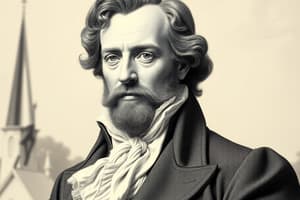Podcast
Questions and Answers
What was the significance of the French Revolution in the rise of nationalism in Europe?
What was the significance of the French Revolution in the rise of nationalism in Europe?
It emphasized the idea of popular sovereignty, liberty, and equality, inspiring nationalist movements across Europe.
How did the Napoleonic Wars contribute to the rise of nationalism in Europe?
How did the Napoleonic Wars contribute to the rise of nationalism in Europe?
Napoleon's conquests spread French revolutionary ideas, fueling nationalist sentiments in occupied territories.
What was the role of industrialization and urbanization in the rise of nationalism in Europe?
What was the role of industrialization and urbanization in the rise of nationalism in Europe?
As people moved to cities, they developed a sense of shared identity and common interests, laying the groundwork for nationalist movements.
What was the significance of the Congress of Vienna in the rise of nationalism in Europe?
What was the significance of the Congress of Vienna in the rise of nationalism in Europe?
What was the significance of the Revolution of 1848 in the rise of nationalism in Europe?
What was the significance of the Revolution of 1848 in the rise of nationalism in Europe?
What was the role of Giuseppe Mazzini in the rise of nationalism in Europe?
What was the role of Giuseppe Mazzini in the rise of nationalism in Europe?
What was the consequence of the rise of nationalism in Europe in terms of nation-states?
What was the consequence of the rise of nationalism in Europe in terms of nation-states?
What was the consequence of the rise of nationalism in Europe in terms of tensions and conflicts?
What was the consequence of the rise of nationalism in Europe in terms of tensions and conflicts?
Flashcards are hidden until you start studying
Study Notes
The Rise of Nationalism in Europe
Factors Contributing to the Rise of Nationalism
- French Revolution (1789): Emphasized the idea of popular sovereignty, liberty, and equality, inspiring nationalist movements across Europe.
- Napoleonic Wars (1803-1815): Napoleon's conquests spread French revolutionary ideas, fueling nationalist sentiments in occupied territories.
- Industrialization and Urbanization: As people moved to cities, they developed a sense of shared identity and common interests, laying the groundwork for nationalist movements.
Key Events and Developments
- ** Congress of Vienna (1815)**: Redrew the European map, creating a system of nation-states that fueled nationalist aspirations.
- Revolution of 1848: Widespread protests and uprisings across Europe, driven by nationalist and liberal ideologies.
- Unification of Italy (1815-1871): Led by Giuseppe Garibaldi and Victor Emmanuel II, Italy became a unified nation-state, inspiring other nationalist movements.
Key Figures and Ideologies
- Giuseppe Mazzini: Italian nationalist who advocated for a unified Italy and promoted the idea of national self-determination.
- Friedrich List: German economist who argued that a strong nation-state was essential for economic development and prosperity.
- Johann Gottlieb Fichte: German philosopher who developed the concept of the "nation" as a distinct cultural and linguistic entity.
Consequences of Nationalism
- Rise of Nation-States: Nationalism led to the creation of new nation-states, redrawing the European map and redefining national identities.
- Tensions and Conflicts: Nationalist rivalries and competing claims to territory contributed to an increase in tensions and conflicts between European nations.
The Rise of Nationalism in Europe
Factors Contributing to the Rise of Nationalism
- French Revolution (1789) introduced the concept of popular sovereignty, emphasizing liberty and equality, and inspired nationalist movements across Europe.
- Napoleon's conquests (1803-1815) spread French revolutionary ideas, fuelling nationalist sentiments in occupied territories.
- Industrialization and urbanization led to a sense of shared identity and common interests among people, laying the groundwork for nationalist movements.
Key Events and Developments
- Congress of Vienna (1815) redrew the European map, creating a system of nation-states that fueled nationalist aspirations.
- Revolution of 1848: widespread protests and uprisings across Europe, driven by nationalist and liberal ideologies.
- Unification of Italy (1815-1871) led by Giuseppe Garibaldi and Victor Emmanuel II, creating a unified nation-state and inspiring other nationalist movements.
Key Figures and Ideologies
- Giuseppe Mazzini: advocated for a unified Italy and promoted national self-determination.
- Friedrich List: argued that a strong nation-state was essential for economic development and prosperity.
- Johann Gottlieb Fichte: developed the concept of the "nation" as a distinct cultural and linguistic entity.
Consequences of Nationalism
- Rise of Nation-States: nationalism led to the creation of new nation-states, redrawing the European map and redefining national identities.
- Tensions and Conflicts: nationalist rivalries and competing claims to territory contributed to an increase in tensions and conflicts between European nations.
Studying That Suits You
Use AI to generate personalized quizzes and flashcards to suit your learning preferences.



